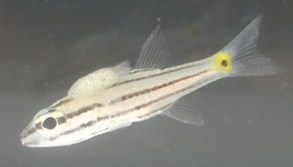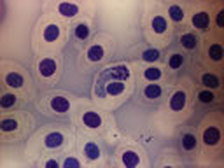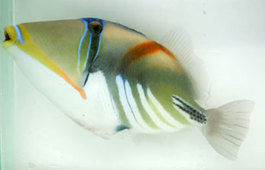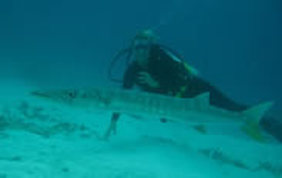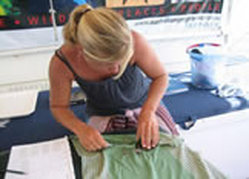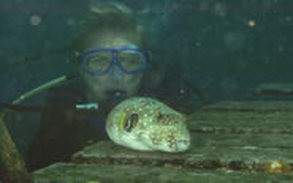Lynda Curtis
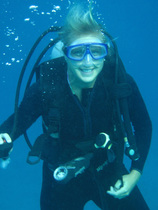
Position: PhD candidate (commenced March 2005)
Education:
Research Interests: Cleaning behaviour, blood parasites, coral reef ecology
Awards & Grants:
Research Projects: Lynda completed her honours in 2002 under the supervision of Dr Lexa Grutter and Dr Sara Ostlund-Nilsson where she examined the physiological and behavioural effects of a parasitic isopod on its host cardinal fish. Lynda worked for the Moreton Bay Waterways and Catchments Partnership as a Scientific Support Officer for 18 months where she collaborated on many projects involving the monitoring and management of environmental health in the creeks, rivers, estuaries and Moreton Bay. Lynda then returned to the University of Queensland to work as a Research Assistant for Dr Lexa Grutter in the Coral Reef Ecology Laboratory, a position which she held for one year before beginning her PhD in 2005 investigating the effects of blood parsasites on coral reef fish physiology and ecology under the supervision of Dr Lexa Grutter, Professor Angela Davies, Dr Nico Smit, Dr Robert Adlard and Dr Malcolm Jones.
Honours Project: "The effect of the parasitic isopod Anilocra apogonae on the physiology and behaviour of the cardinal fish Cheilodipterus quinquelineatus"
Lynda examined the effect of the cymothoid isopod, Anilocra apogonae, on the physiology and behaviour of its host, the cardinal fish, Cheilodipterus quinquelineatus at Lizard Island. Measures of fish body condition and metabolic rate were used along with behavioural studies of activity levels, swimming performance, energy status and mate choice to determine the effect of A. apogonae on its host. The results suggest that cymothoid isopods have a significant effect on their host which was only detected through physiological and behavioural measures and not using traditional measures of body condition.
PhD Project: "The identification of haemogregarine blood parasites in coral reef fish and their affect on host ecology and physiology"
Blood parasites are common in vertebrates in the aquatic environment, with many fish species in both marine and freshwater systems serving as hosts. Among the commonest blood parasites of fishes are the haemogregarines, which are apicomplexan, intracellular parasites of the red and white blood cells, and are broadly related to the parasites that cause malaria in humans. Surprisingly, little work has been done on the occurrence of such blood parasites in coral reef fish on the Great Barrier Reef . As with the transmission of malaria, blood parasites in fishes may be transmitted via arthropod vectors such as ectoparasitic gnathiid isopods, which are ubiquitous on the reef. This study will be the first quantitative investigation designed to examine blood parasites in coral reef fish and the factors which may affect the prevalence and intensity of the infection in the host.
Education:
- 2000 Bachelor of Science, Majors in Marine Biology and Wildlife Biology, University of Queensland.
- 2002 Bachelor of Science Honours, School of Life Sciences, University of Queensland. "The effect of the parasitic isopod Anilocra apogonae on the physiology and behaviour of the cardinal fish Cheilodipterus quinquelineatus". Supervisors: Dr Lexa Grutter and Dr Sara Ostlund-Nilsson.
Research Interests: Cleaning behaviour, blood parasites, coral reef ecology
Awards & Grants:
- 2005 University of Queensland Joint Research Scholarship
- 2006 The Ian Potter Doctoral Fellowship at the Lizard Island Research Station
- 2006 Australian Coral Reef Society Conference Travel Grant
- 2006 The ACRS Undersea Explorer Award
- 2006 Heron Island Research Station Internship
- 2006 University of Queensland Graduate School Travel Grant
- 2006 Sea World Research and Rescue Foundation Grant
- 2007 Australian Coral Reef Society Conference Travel Grant
- 2007 School of Integrative Biology Student of the Month (May)
- 2007 School of Integrative Biology International Conference Travel Grant
Research Projects: Lynda completed her honours in 2002 under the supervision of Dr Lexa Grutter and Dr Sara Ostlund-Nilsson where she examined the physiological and behavioural effects of a parasitic isopod on its host cardinal fish. Lynda worked for the Moreton Bay Waterways and Catchments Partnership as a Scientific Support Officer for 18 months where she collaborated on many projects involving the monitoring and management of environmental health in the creeks, rivers, estuaries and Moreton Bay. Lynda then returned to the University of Queensland to work as a Research Assistant for Dr Lexa Grutter in the Coral Reef Ecology Laboratory, a position which she held for one year before beginning her PhD in 2005 investigating the effects of blood parsasites on coral reef fish physiology and ecology under the supervision of Dr Lexa Grutter, Professor Angela Davies, Dr Nico Smit, Dr Robert Adlard and Dr Malcolm Jones.
Honours Project: "The effect of the parasitic isopod Anilocra apogonae on the physiology and behaviour of the cardinal fish Cheilodipterus quinquelineatus"
Lynda examined the effect of the cymothoid isopod, Anilocra apogonae, on the physiology and behaviour of its host, the cardinal fish, Cheilodipterus quinquelineatus at Lizard Island. Measures of fish body condition and metabolic rate were used along with behavioural studies of activity levels, swimming performance, energy status and mate choice to determine the effect of A. apogonae on its host. The results suggest that cymothoid isopods have a significant effect on their host which was only detected through physiological and behavioural measures and not using traditional measures of body condition.
PhD Project: "The identification of haemogregarine blood parasites in coral reef fish and their affect on host ecology and physiology"
Blood parasites are common in vertebrates in the aquatic environment, with many fish species in both marine and freshwater systems serving as hosts. Among the commonest blood parasites of fishes are the haemogregarines, which are apicomplexan, intracellular parasites of the red and white blood cells, and are broadly related to the parasites that cause malaria in humans. Surprisingly, little work has been done on the occurrence of such blood parasites in coral reef fish on the Great Barrier Reef . As with the transmission of malaria, blood parasites in fishes may be transmitted via arthropod vectors such as ectoparasitic gnathiid isopods, which are ubiquitous on the reef. This study will be the first quantitative investigation designed to examine blood parasites in coral reef fish and the factors which may affect the prevalence and intensity of the infection in the host.
Publications:
Ostlund-Nilsson, S., Curtis, L., Nilsson, G., Grutter, A. (2005) The energetic cost of Anilocra apogonae on its host cardinal fish Cheilodipterus quinquelineatus. Marine Ecology Progress Series 287: 209-216
Becker, J.H.A., Curtis, L.M., Grutter, A.S. (2005) Cleaner shrimp use a rocking dance to advertise cleaning service to clients". Current Biology, Volume 15, 760-764
Contact Details: l.curtis@sib.uq.edu.au
